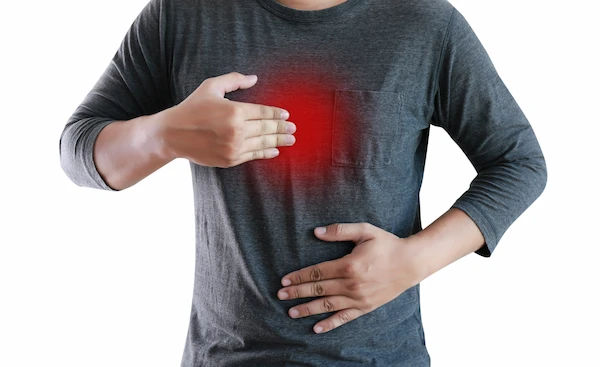Understanding GERD: Symptoms, Causes, and Effective Relief
Uncover the top 10 ranking pages for "GERD" with our indepth competitor analysis. Learn what's working for the competition, from content strategy to on page SEO, and discover actionable insights to improve your own rankings.

Written by Dr. Rohinipriyanka Pondugula
Reviewed by Dr. J T Hema Pratima MBBS, Fellowship in Diabetes Mellitus
Last updated on 13th Jan, 2026

That familiar burning sensation in your chest after a meal—heartburn—is an experience nearly everyone has at some point. But when it becomes a frequent, unwelcome guest, it might be more than just occasional indigestion. You could be dealing with Gastroesophageal Reflux Disease, or GERD. This chronic condition affects millions worldwide, impacting daily life and sleep quality. But what exactly is GERD, and how is it different from simple heartburn? More importantly, what can you do about it? This comprehensive guide will walk you through everything you need to know, from the underlying causes and often missed symptoms to the most effective medical and lifestyle strategies for managing this condition and reclaiming your comfort.
What is GERD, Exactly?
Gastroesophageal Reflux Disease (GERD) is a chronic digestive disorder where stomach acid, or sometimes bile, frequently flows back into your esophagus. This backwash (reflux) irritates the lining of your esophagus, leading to the symptoms we commonly associate with the condition. While it's often simplified as "chronic heartburn," GERD is a more complex medical diagnosis that requires attention to prevent complications.
The Mechanics of Heartburn: Your Lower Esophageal Sphincter (LES)
The key player in this process is a ring of muscle called the Lower Esophageal Sphincter (LES). Think of the LES as a oneway valve located where your esophagus meets your stomach. Its job is to open to allow food and liquid to pass into the stomach and then close tightly to prevent these stomach contents from flowing backward. GERD occurs when this LES is weak or relaxes inappropriately. When it doesn't close all the way or opens too often, highly acidic stomach juice can seep into the esophagus, causing the characteristic burn.
GERD vs. Occasional Acid Reflux: What's the Difference?
It's crucial to distinguish between the two. Occasional acid reflux is normal. Many people experience heartburn after a large, spicy, or fatty meal. It's temporary and often relieved by over-the-counter antacids.
GERD, on the other hand, is diagnosed when mild acid reflux occurs at least twice a week, or moderate to severe reflux occurs at least once a week. It's a persistent, long-term condition that generally requires a more proactive management plan to control and prevent damage to the esophagus.
Recognizing the Signs: Common and Uncommon GERD Symptoms
While heartburn is the most notorious symptom, GERD can manifest in various ways, some of which you might not immediately connect to a digestive issue.
The Usual Suspects: Heartburn and Regurgitation
Heartburn: A burning pain or discomfort that may move from your stomach to your abdomen or chest, or even up into your throat. It often occurs after eating or at night.
Regurgitation: A sour or bitter tasting acid backing up into your throat or mouth. It might feel like a "wet burp" or even lead to vomiting.
Beyond the Burn: Atypical and Severe Symptoms
GERD can also cause symptoms outside the esophagus, known as extraesophageal symptoms. These can be trickier to diagnose:
Chronic cough or laryngitis: Acid irritating the throat and vocal cords.
Asthmalike symptoms: Wheezing or shortness of breath, often worsened by acid reflux triggering a bronchial spasm.
Difficulty swallowing (dysphagia): A sensation of food being stuck in your chest.
Chest pain: This can be severe enough to mimic the pain of a heart attack. Always seek immediate medical attention for unexplained chest pain.
The feeling of a lump in your throat (globus sensation).
Erosion of tooth enamel due to repeated exposure to stomach acid.
Why Me? Uncovering the Causes and Risk Factors of GERD
GERD doesn't have a single cause; it's usually a combination of factors that contribute to a weakened LES.
Lifestyle and Dietary Triggers
Certain foods and habits can relax the LES or increase stomach acid production, including:
Foods: Large, fatty meals, fried foods, citrus fruits, chocolate, garlic, onions, spicy foods, and tomatoes.
Beverages: Alcohol, coffee (and other caffeinated drinks), and carbonated beverages.
Habits: Smoking, which severely weakens the LES.
Other factors: Being overweight or obese (increasing abdominal pressure), eating late at night, or lying down right after a meal.
Underlying Medical Conditions
Several medical conditions can predispose you to chronic acid reflux:
Hiatal Hernia: This occurs when the upper part of the stomach bulges through the diaphragm into the chest cavity. This can weaken the LES and make reflux more likely.
Pregnancy: Hormonal changes and pressure from the growing fetus can lead to GERD.
Connective Tissue Disorders: Like scleroderma.
Delayed Stomach Emptying (Gastroparesis): This can worsen reflux.
Getting a Diagnosis: How Doctors Identify GERD
If your symptoms are frequent and disruptive, it's time to see a doctor.
When to See a Doctor?
Seek medical advice if you:
Experience symptoms several times a week.
Over the counter medications aren't providing lasting relief.
Have nighttime symptoms that disrupt your sleep.
Notice difficulty swallowing or persistent nausea/vomiting.
Experience unexplained weight loss.
If your condition does not improve after trying these methods, book a physical visit to a doctor with Apollo24|7 for a formal evaluation.
Common Diagnostic Tests
Often, a doctor can diagnose GERD based on symptoms. For more severe or unclear cases, tests may include:
Upper Endoscopy: A thin, flexible tube with a light and camera is passed down your throat to examine your esophagus and stomach and take biopsies if needed.
Ambulatory Acid (pH) Probe Test: A monitor is placed in your esophagus to identify when, and for how long, stomach acid regurgitates there.
Esophageal Manometry: Measures the rhythmic muscle contractions in your esophagus when you swallow and checks the strength and function of your LES.
Finding Relief: A StepbyStep Guide to GERD Treatment
Treatment for GERD is typically a stepped approach, starting with the least invasive options.
First Line of Defense: Lifestyle and Dietary Modifications
This is the most crucial step for most people. Natural remedies for severe heartburn often begin here:
Eat smaller, more frequent meals.
Avoid known trigger foods.
Don't lie down for at least 23 hours after eating.
Elevate the head of your bed by 68 inches using blocks under the bedposts (extra pillows are not as effective).
Lose weight if you are overweight.
Quit smoking and limit alcohol.
Over the Counter and Prescription Medications
Antacids
(e.g., Tums, Rolaids): Provide quick, short-term relief by neutralizing stomach acid. They are not for long-term use.
H2 Receptor Blockers
(e.g., Ranitidine [Zantac], Famotidine [Pepcid]): Reduce acid production. They provide longer relief than antacids but are not as strong as PPIs.
Proton Pump Inhibitors (PPIs)
(e.g., Omeprazole [Prilosec], Esomeprazole [Nexium]): These are potent acid blockers that allow time for damaged esophageal tissue to heal. They are typically used for more severe GERD treatment.
Surgical and Other Procedures
When medications and lifestyle changes aren't enough, procedures like Fundoplication (wrapping the top of the stomach around the LES to tighten it) or LINX device implantation (a ring of magnetic beads placed around the LES) may be considered.
Living with GERD: LongTerm Management and Diet Tips
Managing GERD is often a lifelong commitment. Keeping a food diary can help you identify your personal triggers. A best diet for GERD patients typically emphasizes lean proteins, noncitrus fruits, vegetables, and whole grains. Managing stress through techniques like yoga or meditation can also be beneficial, as stress can exacerbate symptoms.
Don't Ignore It: Potential Complications of Untreated GERD
Longterm, uncontrolled GERD can lead to serious health issues:
Esophagitis: Inflammation that can cause bleeding, ulcers, and chronic scarring.
Esophageal Stricture: Narrowing of the esophagus due to scar tissue, leading to swallowing difficulties.
Barrett's Esophagus: A precancerous condition where the lining of the esophagus changes, increasing the risk of esophageal cancer.
Conclusion
Living with GERD can be challenging, but it is a highly manageable condition. Understanding the difference between occasional discomfort and a chronic disease is the first step. By recognizing the wide array of symptoms, identifying your personal triggers, and committing to sustainable lifestyle changes, you can significantly reduce the frequency and severity of flareups. Overthecounter and prescription medications offer powerful relief when needed, and procedural options exist for severe cases. The most important takeaway is to not dismiss persistent symptoms. Proactive management under medical guidance is key to preventing complications and maintaining your quality of life.
If symptoms persist beyond two weeks, consult a doctor online with Apollo24|7 for further evaluation and a personalized treatment plan.
Quick Takeaways
GERD is chronic acid reflux occurring more than twice a week, requiring medical attention.
Symptoms extend beyond heartburn to include regurgitation, chronic cough, and chest pain.
A weak Lower Esophageal Sphincter (LES) is the primary mechanical cause.
Key triggers include fatty/spicy foods, large meals, alcohol, smoking, and obesity.
Diagnosis may involve an endoscopy or pH monitoring.
Treatment starts with lifestyle changes (diet, weight loss, elevation), then medications like PPIs.
Untreated GERD can lead to serious complications like Barrett's esophagus.
More articles from Gerd
Frequently Asked Questions
1. What is the main difference between GERD and acid reflux?
Acid reflux is a single event or occasional occurrence of stomach acid entering the esophagus. GERD (Gastroesophageal Reflux Disease) is the chronic, diagnosed form where this happens frequently (twice a week or more) and can lead to complications.
2. Can GERD cause symptoms that feel like a heart attack?
Yes, the chest pain associated with GERD can be severe and mimic the pain of a heart attack. It is crucial to seek immediate emergency medical attention for any unexplained chest pain to rule out a cardiac event.
3. Are there any natural remedies for severe heartburn?
While not a substitute for medical advice, some find relief with natural remedies like chewing sugarfree gum to increase saliva and neutralize acid, drinking aloe vera juice (internally), or consuming ginger or licorice. However, the most effective natural approach is consistently avoiding trigger foods and practicing good eating habits.
4. What is the best sleeping position for GERD?
Sleeping on your left side is considered best, as it keeps the junction of the stomach and esophagus above the level of gastric acid. Most importantly, elevate the head of your entire bed by 68 inches to use gravity to prevent reflux.
5. Can GERD go away on its own?
True GERD is a chronic condition that typically does not go away on its own. However, its symptoms can be effectively managed and controlled to the point of being negligible through consistent lifestyle changes and, if necessary, medication. Symptoms may come and go in waves.


